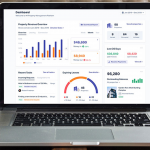My Real Estate Advisor
A dynamic blend of human connection, market expertise, and operational efficiency fuels the thriving real estate industry. The irreplaceable human touch pairs with technology to transform agents and agencies into excel-driven forces within today’s competitive landscape. Nonetheless, navigating many options often makes choosing an apt real estate agency software solution feel like an intricate maze.
Taking a strategic approach is crucial before significant investment; this blog post–your guide–is laden with industry expert insights and an essential roadmap for consideration.
1. Unveiling Your Needs & Mapping Your Goals:
Pause and delve into your agency’s unique needs and goals before you get swept away by flashy features and enticing demos. Which areas are calling out for improvements? Does lead generation feel sluggish, client communication needs a personal touch, or are manual processes bogging down transaction management? Your compass, identifying specific pain points and desired outcomes, will guide you toward software solutions that address your challenges effectively – propelling you closer to your vision.
If lead generation is your primary concern, prioritize software endowed with robust CRM capabilities, practical marketing automation tools–and seamless integration to lead capture platforms. Conversely, should you concentrate on streamlining transaction management, delve into solutions that offer e-signatures—document management features—and real-time communication channels. Remember this crucial point: do not let non-essential bells and whistles distract you from your core objectives; clarity remains paramount.
2. Empowering Your Team: User-friendliness & Beyond:
To maximize the impact, vital software adoption remains imperative: envision investing in an exceptionally potent tool–yet your team grapples with its complexities. This scenario invariably catalyzes frustration; further exacerbating this issue are missed opportunities. Therefore, prioritizing user-friendliness is paramount.
Actively pursue software boasting an intuitive interface; it should foster effortless navigation and a minimal learning curve. Specifically, seek out visual cues, clear menus, and context-sensitive help resources that are readily available. Moreover, contemplate providing comprehensive training programs and ongoing support: this strategy will guarantee your team’s confidence in utilizing the software’s full potential – thus empowering them.
Always remember: technology should function as an ally–not a foe. Opt for a solution that cultivates a seamless user experience; avoid selecting one that further compounds the complexity of your team’s hectic schedules.
3. Scaling with Vision: Adaptability & Seamless Integration:
The real estate industry embodies dynamism; your agency must adapt. Avoid the confinement of software that grapples with matching your growth’s momentum: instead, choose a scalable solution capable of adjusting in response to evolving needs as team expansion occurs, the client base broadens, and service diversification takes place.
Moreover, achieving a seamless integration with your current technology ecosystem is crucial. Visualize the inefficiencies of operating siloed systems: data loss during translation and tasks necessitating double entry. Actively pursue software that flawlessly integrates with your email platform, accounting software, and marketing automation tools–alongside any other existing solutions upon which you rely. Fostering streamlined workflows, this interconnectedness eliminates data redundancy; it equips your team to work more intelligently–not necessarily harder.
4. Building Trust: Data Security & Compliance in the Digital Age:
Real estate transactions involve sensitive information—financial details of your clients, their data, and property specifics. Protecting this valuable information is non-negotiable; therefore, you must ensure that the software prioritizes data security with robust measures such as multi-factor authentication – a process that ensures only authorized users gain access to the system–data encryption at rest and in transit—the latter protecting against potential breaches during transmission—and regular security audits which serve to monitor vulnerabilities regularly.
Only underestimating the importance of complying with industry regulations such as GDPR or HIPAA, particularly for international operations, is advisable. Ensure your software provider adheres to these rigorous data protection protocols; remember that a single data breach can swiftly erode client trust and tarnish your reputation. Select a solution that instills peace of mind and ensures the security and compliance of your agency with your client’s data.
5. Calculating Value: The Numbers Game of Cost and Return on Investment (ROI)
Significantly, software pricing can vary; however, the most cost-effective option is not always marked by a cheap sticker price. Therefore, delve beyond this initial indicator–probing into long-term affordability and potential return on investment (ROI). Careful consideration becomes imperative to achieve such insightful scrutiny of subscription models, hidden fees, and implementation costs.
Remember: cost should not serve as your sole determinant. Does the software actively enhance your agency’s efficiency – through task automation, workflow streamlining, and administrative overhead reduction? Equally important, will it provide your team with tools that accelerate lead conversion, amplify deal closures, and deliver service excellence to clients? Quantify these potential benefits and translate them into measurable ROI to justify the investment.
6. Seeking Guidance: Partnering with the Experts:
It would help if you ventured alone into the intricate realm of real estate software. Instead, harness industry professionals’ expertise to acquire valuable insights and informed recommendations. Consult with specialists in real estate technology who excel at pairing agencies with appropriate solutions according to their distinct requirements and budgetary considerations.
Participate actively in industry events and workshops; through this engagement, you can connect with peers who utilize analogous software. Their first-hand experiences and practical advice offer invaluable perspectives: a lens into the real-world application of such tools. Equally important are online communities and forums – these serve as excellent resources for gathering user feedback and gleaning best practices.
Selecting the appropriate software involves more than just obtaining a tool–it necessitates constructing a strategic partnership with an understanding vendor, one who is committed to your business’s success. Do not shy away from posing inquiries, demanding demonstrations- and negotiating terms: these are all crucial steps towards guaranteeing that you discover a solution that aligns faultlessly with your agency’s vision and long-term objectives.
Follow these crucial considerations and leverage the available expertise: you will confidently navigate the real estate software landscape. Make an informed decision that empowers your agency to thrive in the digital age; always remember that the right software solution is not merely a cost but represents an investment in your agency’s future. This strategic choice unlocks efficiency, fosters client satisfaction, and positions you for sustainable growth and success.
Also Read, The Dos and Don’ts of Real Estate Agency Software in 2024
Beyond the 6
This blog post merely lays a foundational framework; however, your journey–far from reaching its conclusion–must continue. As you plunge deeper into your research, ponder these additional factors specific to your agency’s unique needs.
Can agents and clients conveniently access the software on smartphones and tablets while on the go?
Does the software provide robust tools for reporting and analytics to monitor key performance indicators, identify areas that require improvement, and gauge the impact of your efforts?
Can you customize the software to align with your agency’s branding, specific workflows, and reporting preferences?
Does the software actively employ Artificial Intelligence (AI) features like lead scoring, automated responses, or market trend analysis?
Make the crucial decision to invest in real estate software. Adopt a strategic approach, conduct comprehensive research, and pose pertinent questions; this process will enable you to select an ideal solution that integrates into your agency’s success narrative. This empowerment allows for exceptional service delivery, surpassing client expectations – ultimately leading towards attaining business objectives.





